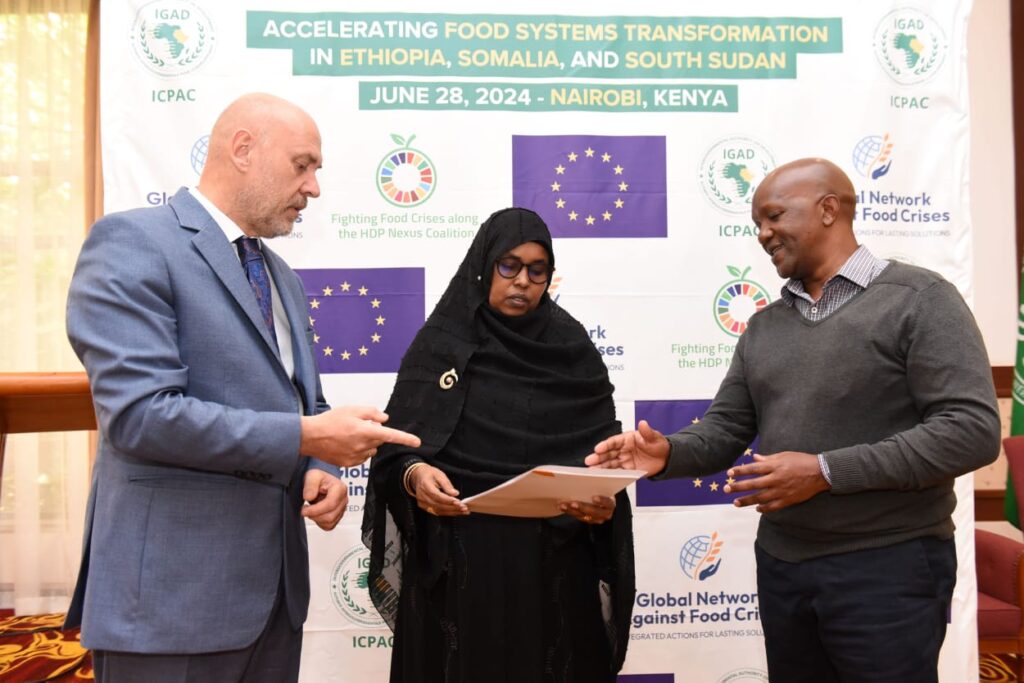Accelerating Food Systems Implementation in the IGAD Region

Facilitating the Sharing of Best Practices between Ethiopia, Somalia, and South Sudan, Strengthening Alignment with Regional Commitments, and Accelerating National and Regional Implementation
Senior experts and policymakers from Ethiopia, Somalia, and South Sudan convened in Nairobi for a high-level regional meeting to discuss the acceleration of food systems implementation in the IGAD region. This significant gathering followed consultative missions to Ethiopia and Somalia, aimed at identifying key priorities for strengthening national food systems pathways.
The event, organized by IGAD, the Global Network Against Food Crises (GNAFC) – Technical Support Unit, and the Humanitarian-Development-Peace (HDP) Nexus Coalition, included a two-day workshop in Naivasha and culminated in a Ministerial meeting in Nairobi. The meeting’s objectives were to facilitate the sharing of good practices, consolidate a harmonized approach to food systems strengthening, identify common priorities, and secure Ministerial approval for accelerated implementation.
Key Objectives and Commitments:
- Sharing Good Practices: The meeting facilitated knowledge exchange between Ethiopia, Somalia, and South Sudan, highlighting successful actions that can be replicated and addressing common challenges to accelerate food systems transformation.
- Harmonized Approach: Emphasis was placed on a coordinated regional approach to food systems strengthening, ensuring alignment with IGAD commitments and leveraging support from development partners.
- Identifying Priorities: The meeting identified common priorities for food systems transformation across the three countries, ensuring that these priorities are anchored in global, regional, and national support mechanisms.
- Ministerial Approval: Official validation and endorsement of identified priorities and activities were secured to ensure progress is supported by high-level political commitment.
Statements from Ministers and Delegates:
The Ministers and Heads of Delegations from Ethiopia, Somalia, and South Sudan reaffirmed their commitment to addressing food insecurity and enhancing the resilience of vulnerable communities. They appreciated the hospitality of the Kenyan government and acknowledged the efforts of IGAD, ICPAC, and GNAFC in addressing food crises in the region.
Challenges and Data Insights:
The meeting recognized the scale of the challenges faced in the region, with recent data indicating that approximately 24% of the East African population faced significant food insecurity in 2023. Over 12 million individuals were categorized as being in Emergency (IPC Phase 4), with an additional 80,000 expected to reach Catastrophe (IPC Phase 5) in Somalia and South Sudan. Projections for 2024 indicate that more than 7 million individuals in South Sudan and over 3 million in Somalia will face severe levels of acute food insecurity (IPC Phase 3 or higher), with 16 million people in Ethiopia needing emergency food assistance.
Key Acknowledgements and Commitments:
- Systemic Risks: The persistent food crises are exacerbated by conflict-induced displacement, climate-related shocks, and economic challenges at multiple scales.
- HDP Nexus Principles: The role of HDP Nexus principles in transforming food systems through inclusive engagement, national ownership, and multi-sectoral coordination was acknowledged.
- Capacity Building: Commitment to regional and national capacity-building was declared, aiming to translate strategic policy commitments into actionable results.
- Inclusive Approach: Efforts to extend national-level progress to sub-national levels were encouraged, prioritizing the needs of the most vulnerable populations.
- National Leadership: Reaffirmation of national leadership in coordinating and harmonizing ministerial priorities within development planning frameworks.
- Regional Communications Strategy: Urging IGAD and partners to develop a regional food systems communications strategy to sustain high-level political support.
- Strengthening Coordination Mechanisms: Commitment to enhancing coordination within and between governments and key stakeholders, prioritizing resilience and long-term investment.
- Data Management Solutions: Building accurate data management solutions, monitoring, evaluation, and learning (MEL) frameworks, and accessible food systems dashboards.
- Financing Mechanisms: Recommending financing mechanisms to strengthen food systems, leveraging national budgets, development partner resources, and private sector investments.
- Balancing Priorities: Striving for a strategic balance between humanitarian and development priorities, focusing on sustainable programming and durable solutions.
The meeting concluded with a joint declaration of commitment to transforming food systems in the IGAD region, ensuring that efforts are sustainable and inclusive, addressing the root causes of food crises, and enhancing the resilience of vulnerable communities.





